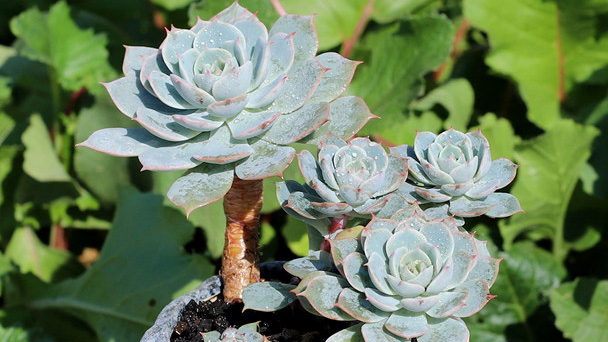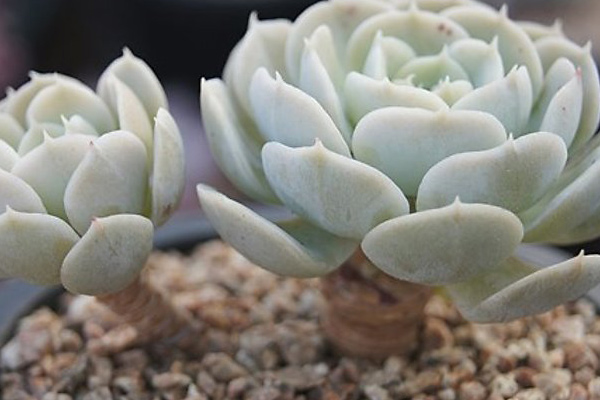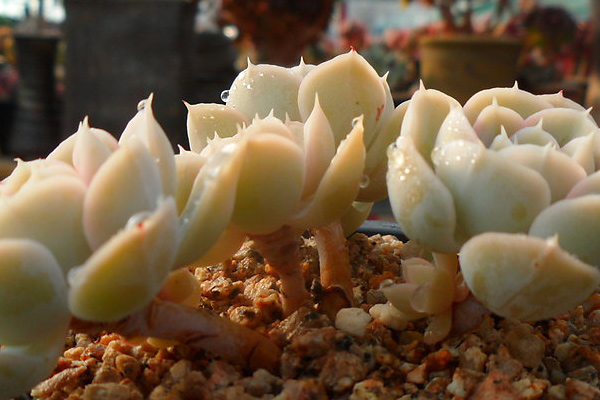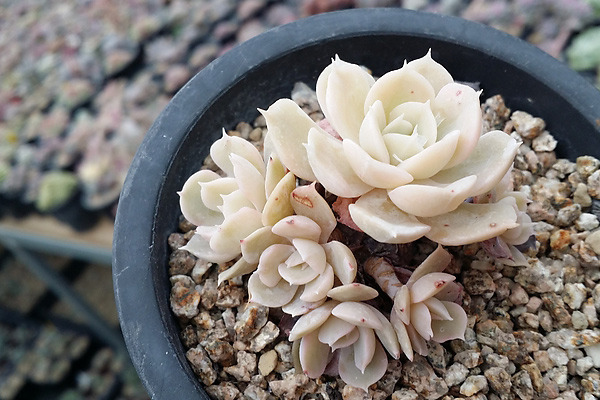Echeveria Runyonii Topsy Turvy Grow & Care Guide
Written by Iris
Nov 03 2021

Echeveria Runyonii (Echeveria Topsy Turvy) is a succulent plant native to Mexico, the plant is small and medium-sized. Echeveria Runyonii is a kind of small and famous fleshy. The leaves are relatively large and the arrangement is more tangible. It is still loved by many people. Echeveria Runyonii are grayish green with a thick layer of hoarfrost on the surface. The shape is very beautiful. It is a succulent plant that is very suitable for potting indoors. Although it does not have a particularly brilliant color, it still cannot stop people from loving it. It is attracted by its leaves.
This type of succulent prefers a warm climate. It can survive at zone 9b-11b which is around -3.9°C (25°F). If you live in a cold area, it is better to plant Topsy Turvy in an indoor environment. As long as it gets enough sunlight, the plant will grow happily.
When selecting what pot to use be sure that you understand the difference between the material used (See our guide on how to pick the best plant pot).

In the middle of summer, keep echeveria topsy turvy bright but skip the very hot, and burning western sun, which can fry them. Also, the dramatically changing amount of the sunlight is a stress source for your plants. If you are going to move your outdoor succulents to the interior places, do it gradually.
Although excess water is what most often kills it, it also likes having a lot of light, but not scorching direct sun, as when behind a window. If the foliage gets sunburned, the best thing to do is behead the plant, and grow a new one, taking off the damaged leaves.
When you water your Silver Spoons Echeveria, give it a good soak, until the water passes through the soil and comes out the drainage holes. Allow the plant a few minutes to absorb more water from the draining tray and then throw away the excess water. You should be careful because overwatering may result in rotting or fungal disease.
Water echeveria topsy turvy regularly in spring and summer when the temperatures are rising and when the Silver Spoons succulents are growing. Don't water the plants that grow outdoors plants in winter, as they need to rest. Never let water linger in the rosette because this might lead to fungal diseases or rot that will easily destroy the plant.
Read Next:
Echeveria Elegans Mexican Snowballs Care & Growing Guide
Echeveria Laui (Echeveria Succulent) Care Guide
Echeveria Agavoides Care & Propagation
Echeveria Pulvinata (Chenille Plant) Care & Propagation Guide
Echeveria Nodulosa (Painted Echeveria) Care Guide
Echeveria Imbricata (Blue Rose Echeveria) Grow & Care Guide
Echeveria Setosa: Grow & Care for Mexican Firecracker
Echeveria Black Prince Succulent Grow & Care Guide
Echeveria Takasago No Okina Care Guide
Echeveria Mebina Care Guide
Where to Grow Echeveria Runyonii Topsy TurvyHow to Grow Echeveria Topsy TurvyEcheveria Runyonii Topsy Turvy Propagation with SeedsEcheveria Runyonii Topsy Turvy Propagation with Stem CuttingsEcheveria Runyonii Topsy Turvy Propagation with Leaf CuttingsEcheveria Runyonii Topsy Turvy Propagation with OffsetsHow to Care for Echeveria Runyonii Topsy TurvyEcheveria Runyonii Light RequirementEcheveria Runyonii Soil CareEcheveria Runyonii WateringEcheveria Runyonii Temperature & Humidity CareEcheveria Runyonii FertilizerEcheveria Runyonii Pests & DiseasesIs Echeveria Runyonii Topsy Turvy pet safe?
Where to Grow Echeveria Runyonii Topsy Turvy
Echeveria runyonii ‘Topsy Turvy’ succulents need strong light. When planting this succulent type in a garden, make sure it gets sunlight. Full to partial sun is the best for its growth. It is better to grow outdoor rather than indoor.This type of succulent prefers a warm climate. It can survive at zone 9b-11b which is around -3.9°C (25°F). If you live in a cold area, it is better to plant Topsy Turvy in an indoor environment. As long as it gets enough sunlight, the plant will grow happily.
When selecting what pot to use be sure that you understand the difference between the material used (See our guide on how to pick the best plant pot).

How to Grow Echeveria Topsy Turvy
There are three main propagation methods for Echeveria Runyonii: using stem cuttings, leaf cuttings, or through offsets.Echeveria Runyonii Topsy Turvy Propagation with Seeds
This Topsy Turvy succulent type is a slow grower so even if it can be propagated by its seeds, this method is not recommended. To propagate from the seeds, plant the seeds in a well-draining soil mixture. This method can be used outdoors. In cooler areas, indoor propagating is recommended.Echeveria Runyonii Topsy Turvy Propagation with Stem Cuttings
When propagating Topsy Turvy from cuttings, cut a leaf from the mother plant carefully with a clean knife or scissors. Before replanting, wait for a few days to allow it to callous. Use well-draining soil for your new succulent plant. Don’t forget to water when the soil dries out.Echeveria Runyonii Topsy Turvy Propagation with Leaf Cuttings
When propagating Topsy Turvy plant with leaves. You should get a leave carefully from the mother plant. It should be a healthy leave that has no part left on the stem. In this way, the propagation will work. Before replanting, wait for a few days to allow it to callous. Use well-draining soil for your new succulent plant. Don’t forget to water when the soil dries out.Echeveria Runyonii Topsy Turvy Propagation with Offsets
Topsy Turvy propagates from offsets. To be able to propagate from the mother plant, you might wait several years for the main plant to produce an offset. To start this process, use a sharp knife and remove an offset from the main plant. When you remove the offset, clean the extra soil from it. Before replanting, wait for a few days to allow it to callous. Use well-draining soil for your new succulent plant. Don't forget to water when the soil dries out.
How to Care for Echeveria Runyonii Topsy Turvy
Echeveria Runyonii Light Requirement
Echeveria runyonii grow well in full or partial sun. It do best at a southern, eastern or western exposure. When the plant doesn't get enough light, it starts growing tall, become stretched and lose their color, their leaves are sparse around a long, thin stem. This means the plant is reaching for light. If you grow the plant on a windowsill, turn the plant occasionally to ensure that all sides of your plant get enough sun.In the middle of summer, keep echeveria topsy turvy bright but skip the very hot, and burning western sun, which can fry them. Also, the dramatically changing amount of the sunlight is a stress source for your plants. If you are going to move your outdoor succulents to the interior places, do it gradually.
Although excess water is what most often kills it, it also likes having a lot of light, but not scorching direct sun, as when behind a window. If the foliage gets sunburned, the best thing to do is behead the plant, and grow a new one, taking off the damaged leaves.
Echeveria Runyonii Soil Care
Echeveria runyonii will grow very well in succulent and cactus soil as long as the soil you choose provides awesome drainage. As long as you have quality soil, your topsy turvy plant will thank you. Also you should be using some grit such as coarse sand or Perlite to provide the best drainage possible as these work well at stopping water from holding in the soil for longer than is good. Utilizing these few things will yield great results for your topsy turvy succulent and puts you on the right track and not the wrong train.Echeveria Runyonii Watering
Echeveria runyonii is not very picky, and like most succulents, it does not take offense if you forget to water it sometimes. It is water sensitive, therefore it is recommended to utilize the ‘soak and dry’ technique. This means that you should make sure the soil dries out between waterings.When you water your Silver Spoons Echeveria, give it a good soak, until the water passes through the soil and comes out the drainage holes. Allow the plant a few minutes to absorb more water from the draining tray and then throw away the excess water. You should be careful because overwatering may result in rotting or fungal disease.
Water echeveria topsy turvy regularly in spring and summer when the temperatures are rising and when the Silver Spoons succulents are growing. Don't water the plants that grow outdoors plants in winter, as they need to rest. Never let water linger in the rosette because this might lead to fungal diseases or rot that will easily destroy the plant.
Echeveria Runyonii Temperature & Humidity Care
The ideal temperatures for this plant are 65° – 70° degrees Fahrenheit (18° – 21° C).This plant is not cold-hardy, and unable to survive hard frost, but is still able to take cooler temperatures. The USDA hardiness zone of E. Runyonii are 9 to 11.Echeveria Runyonii Fertilizer
Echeveria runyonii Topsy Turvy have low fertilizer needs coming from areas of low fertility where most soil has washed away. Adding a flower plant fertilizer will help extend the blooming and increase its beauty. Feed once a month with a dilute solution like a 15-15-15 or lower in summer when temperatures are warm and light is high. Reduce or eliminate fertilizer in winter or to control size.Echeveria Runyonii Pests & Diseases
Echeveria runyonii plant is rabbit and deer resistant. It is mostly trouble-free, but be on a lookout for attacks on succulents from aphids, mealybugs, and vine weevil. Make sure to avoid overwatering echeveria topsy turvy as this leads to fungal diseases and rotting.
Is Echeveria Runyonii Topsy Turvy pet safe?
Echeveria runyonii is considered to be pet safe at least for common pets such as cats and dogs. Don't quote me on all other types of pets.Read Next:
Echeveria Elegans Mexican Snowballs Care & Growing Guide
Echeveria Laui (Echeveria Succulent) Care Guide
Echeveria Agavoides Care & Propagation
Echeveria Pulvinata (Chenille Plant) Care & Propagation Guide
Echeveria Nodulosa (Painted Echeveria) Care Guide
Echeveria Imbricata (Blue Rose Echeveria) Grow & Care Guide
Echeveria Setosa: Grow & Care for Mexican Firecracker
Echeveria Black Prince Succulent Grow & Care Guide
Echeveria Takasago No Okina Care Guide
Echeveria Mebina Care Guide
Latest Updated
- Benefits of Bugleweed - 7 Science-backed Health Benefits
- Bugleweed Dangers & Side Effects - Is It Poisonous?
- How to Plant Evergreen Trees - What You Should Know
- When to Plant Evergreens - Grow Guide for Evergreen Trees
- 12 Wonderful Evergreen Shrubs for Your Garden
- 12 Popular Evergreen Plants with Pictures for Beginners
- When And How To Prune A Lilac Bush Like a Pro
- How to Grow & Care for Lilac Vine (Hardenbergia Violacea)
- Japanese Lilac Tree (Syringa Reticulata) Care & Propagation Guide
- Shumard Oak Pros and Cons - What to Know
Popular Articles
- Winter maintenance of Antirrhinum Majus
- How to Grow Terminalia Mantaly Tree
- How to Grow and Care for Crossostephium Chinense
- How to grow Antirrhinum Majus in spring
- Peristeria Elata (Dove Orchid) Profile: Info & Care Guide
- Underwatered Snake Plant (Sansevieria Trifasciata) - Signs And How To Fix
- How to Care for Brazilian Jasmine Plant (Mandevilla Sanderi)
- How to Grow & Care for Graptopetalum Purple Delight in Summer
- Rosa Chinensis (China Rose): Plant Growing & Care Tips
- How to Care for Baby Sun Rose (Aptenia Cordifolia)